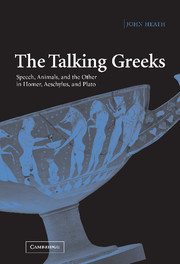Book contents
- Frontmatter
- Contents
- Preface and acknowledgments
- Introduction
- Part I SPEECH, ANIMALS, AND HUMAN STATUS IN HOMER
- Chapter 1 Bellowing like a bull: Humans and other animals in Homer
- Chapter 2 Controlling language: Telemachus learns to speak
- Chapter 3 Talking through the heroic code: Achilles learns to tell stories
- Part II LISTENING FOR THE OTHER IN CLASSICAL GREECE
- Part III SPEECH, ANIMALS, AND HUMAN STATUS IN CLASSICAL ATHENS
- Epilogue
- Bibliography
- Index
Chapter 3 - Talking through the heroic code: Achilles learns to tell stories
Published online by Cambridge University Press: 22 September 2009
- Frontmatter
- Contents
- Preface and acknowledgments
- Introduction
- Part I SPEECH, ANIMALS, AND HUMAN STATUS IN HOMER
- Chapter 1 Bellowing like a bull: Humans and other animals in Homer
- Chapter 2 Controlling language: Telemachus learns to speak
- Chapter 3 Talking through the heroic code: Achilles learns to tell stories
- Part II LISTENING FOR THE OTHER IN CLASSICAL GREECE
- Part III SPEECH, ANIMALS, AND HUMAN STATUS IN CLASSICAL ATHENS
- Epilogue
- Bibliography
- Index
Summary
Telemachus may become a speaker of words, but it is of course Achilles at whom Peleus directs his counsel to become both a “speaker of words and a doer of deeds.” With the defeat of Hector, Achilles proves once again that he is a doer of deeds. But does the young hero ever become a true speaker of words, as his father had hoped? Does he mature verbally in some way by the end of the epic? Does he, in other words, go through some journey analogous to that of Telemachus? Does his speech reveal an “evolution of a hero”?
Like Telemachus at the opening of the Odyssey, Achilles begins the Trojan War, according to Phoenix, as a nêpios: “On that day when Peleus sent you from Phthia to Agamemnon, you a nêpios, knowing nothing yet of leveling war, nothing of councils, where men are distinguished” (9.440–1). Achilles and Telemachus are the only characters in the epics to be described as “growing like a sapling (ernei isos, Il. 18.56 and 437 = Od. 14.175). Each is a young man who has a mentor to guide him on his journey. And each begins his epic with an assembly scene in which he feels publicly humiliated and, in frustration at his ineffectuality, throws to the ground a scepter, the symbol that yokes speaking and authority (poti de skêptron bale gaiêï, Il. 1.245 = Od. 2.80, the only times the expression occurs in the epics).
- Type
- Chapter
- Information
- The Talking GreeksSpeech, Animals, and the Other in Homer, Aeschylus, and Plato, pp. 119 - 168Publisher: Cambridge University PressPrint publication year: 2005



